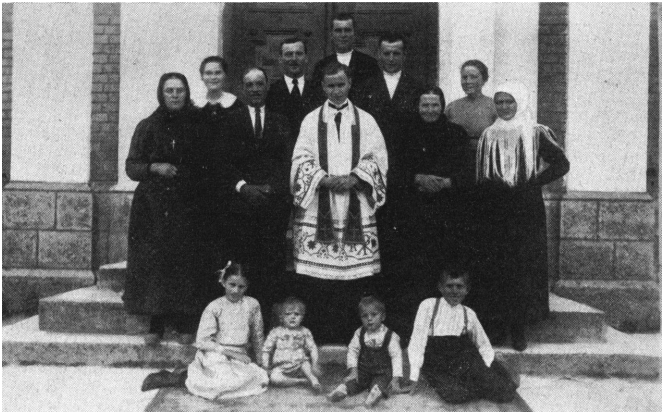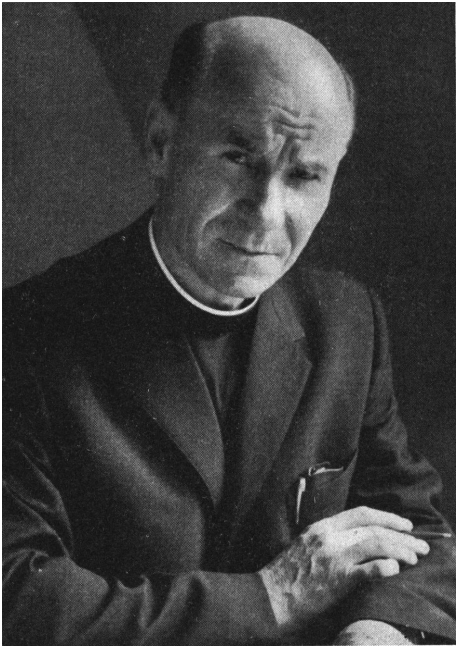Continuation of the Holy Gospel According to John
At that time Jesus said to the multitudes of the Jews: My Flesh is meat indeed, and My Blood is drink indeed. He that eateth My Flesh, and drinketh My Blood, abideth in Me, and I in him. As the living Father hath sent Me, and I live by the Father, so he that eateth Me, the same also shall live by Me. This is the bread that came down from Heaven. Not as your fathers did eat manna and are dead. He that eateth this Bread shall live for ever.
Transcription of Homily
The Saving Words of the Gospel.
He who eats of this bread shall live forever.
In the Name of the Father, and of the Son, of the Holy Ghost. Amen.
When Our Lord delivers this Eucharistic doctrine for the first time, His hearers reel. They’re shocked. They’re disgusted. They turn away from Him interiorly before they walk away. He seems to lose a majority of the hearers because of this doctrinal point. In fact, if you read this Gospel further, you’ll see that Judas’ betrayal is somehow tied into his doubts about this doctrine.
When the world confronts us with the hard teachings of Christ and His Church, do we feel embarrassed, or do we say truly and clearly, and do we know how to defend and promote the teachings of the Church, not to win an argument but to win a soul? It’s our duty, to be bearers not only of the Body of Christ but His Word and that means to be able to enter into apologetics with knowledge and with charity, with humility, knowing that we are merely servants. We’re not trying to win an argument, we want to win a soul for Christ. And part of that means saying the truth. Sometimes when the world rejects it, one can have a temptation like Judas had to be embarrassed about the harshness of the doctrine, and we see what that did. This whittling away of the Faith, if we are not in agreement, if we don’t accept one aspect of the Deposit of Faith, we don’t have any supernatural faith. In fact, if we simply agree with the entirety of the Deposit of Faith, because it makes sense, it’s still not salvific for us. It’s an act of the will under the action of grace to accept everything Christ and His Church teaches. So, it’s faith seeking understanding. It’s an act of the will, under the action of grace, before an act of the intellect. Otherwise, we fall into mere intellectual assent, and this is a human agreement and there’s nothing salvific about that.
And when Our Lord sees the reaction of His hearers, how they’re reeling at His words, He doubles down and says, “If you do not eat of this bread, you have no life within you,” and He’s speaking in the present tense. And then, if we look at the word He uses for eat, it’s not really eat, it’s τρώγειν, trogein, which means to – it’s a very graphic word – it can mean to feed on, to gnaw, to tear apart with one’s teeth, almost like an animal who is engrossed in the carcass it’s eating – he’s not thinking about anything else. But obviously, when Our Lord uses it, He uses this verb on purpose to show that this is a real act of consuming His Flesh. And nonetheless, this is not physical flesh. This is not mana that fed the Jews who then die.
This is the Bread of Life. And therefore, this gnawing, this feeding on, this devouring, this being hyper-focused and obsessed with what we are consuming is in interior action, and, therefore, it requires all of the faculties of our soul which ought to be engrossed in what we’re doing, with our memory, with our intellect, with our will, with our affections. It requires everything, if this Eucharistic communion, is to bear fruit. We can materially receive the Body of Christ in a state of grace, but with distraction, thinking about other things, and yes, we’ve received the Body of Christ, but the graces have been missed. So, we have to learn from the word Our Lord says of this eating, this gnawing, this feeding on, it means we have to be hyper-focused in our communions, in our Eucharistic life, so nothing, nothing else occurs to us in the moment. And if a distraction comes, we just go back to Him with calm, but with totality.
There was a priest who hungered for Our Lord, just as the Lord was describing. One of the great graces in the first year of my ordination: Meeting this priest. His name was Monsignor Hieronymus Menges. He was from Bucharest. I met him when I was living in Germany. And he was tapped to be the Archbishop of Bucharest. But the communists understood that this young, vibrant, strong-willed priest would make a formidable foe as bishop of Bucharest, and so he was put in solitary confinement for 13 years.
He said the tortures were horrible, the interrogations that seemed unending were terrible, but the worst torture was not offering Mass. The worst torture was not being able to go to Adoration, not being able to make visits to the Blessed Sacrament. He said there was such a longing, such a hunger in his heart for the Eucharist. That was the worst part of his 13 years of solitary.
One day, he thought, since he had no calendar, he thought it was December 24. And he said to our Lord, “I’ve never asked you anything except for perseverance during this trial, and now I want to ask you for an extraordinary gift: The ability to offer at least Midnight Mass tonight.”
He would be in his cell for 23 hours a day, and there was an hour a day in which the prisoners were allowed to walk in a circle to get a little exercise. And there was a young man that he had never seen before who wasn’t dressed like a prisoner – was probably his guardian angel – who said, “You look a little hungry,” and he gave him a host. He said, “You look a little thirsty.” He gave him a little vial with wine in it and he stuffed that in his prisoner’s shirt. And the guards were all looking elsewhere. And he said he couldn’t wait till nightfall to offer his Midnight Mass. He had the Mass memorized, and he said the Mass. He said he used the palm of his hand as his chalice, and he scratched a little ice off of the window for the water to add to the wine.
And he said when he began the Sanctus, all of a sudden, he quoted St. Paul, “I don’t know if heaven came to me, or if I went to heaven, but I could no longer see my prison walls. I saw endless rows of angels and saints awaiting the words of Consecration.” And once I said those words of Consecration, they all, kneeling, inclined their heads in reverence. And he said they stayed in that posture until the final blessing.
This is a man who knew what it was to hunger for Christ, to thirst for him. Do we? It’s in our hands, with what longing, with what devotion, with what gratitude we receive Our Lord. And as much as we want it to be, that’s how deep our Communion will be. It’s each one of us making his own choice. If we think of our Communion as the first Communion, I’m going to make the last Communion, I’m going to make the only Communion I’m going to make in this lifetime; if I approach the Eucharist each time with that attitude, each time it comes much more profound. May that be so for all of us.
In the Name of the Father, and of the Son, the Holy Ghost. Amen
— Fr. Ermatinger



